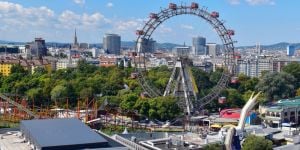
Buying a house or any property is never easy in any situation, whether you are a foreigner or not. But being one can make it a little extra tricky because you don't know the market and what to look out for on your hunt for your dream house. So here is an insight into Vienna's real estate market to help you make the right choice regarding the purchase of a property.
Good to know:
The acquisition of property is possible for anyone and is not restricted to Austrian citizens.
Vienna's real estate market
Since the crisis hit the Viennese real estate market in 2008, the prices went through the roof, like in any other European city.
They rose by 34.7 per cent, which is still less than, for example in London, where prices in the centre of London went up by 55 per cent.
Therefore Vienna remained an attractive place to buy houses or apartments.
If you are looking to buy something very luxurious, you will find this in the inner districts, like the first district, which is also a UNESCO heritage site.
Over the last couple of years, some parts of the second district also became very trendy amongst buyers.
Prices for high-end apartments will start at around 1,000 $ per square meter. If you are more interested in buying a house, the 13th, 18th and 19th districts are where you are going to find the big historical villas. They are located about 15 to 20 minutes outside the city centre, so you will still find public transportation and enjoy the perks of living in nature.
This kind of housing isn't going to be cheap, so expect to pay up to 12 million dollars for a real Viennese historical villa in these districts.
Procedures for buying property in Vienna
To legally buy any property in Vienna, there are a few crucial steps you should follow.
First, if you are not sure how to get started, it is helpful to look for more detailed information on www.help.gv.at.
For a better understanding of zoning and development, you can take a look at plans at the municipal offices of Vienna.
You can also get information about mapping, legislation and property surveying from the official website of the Federal Office of Metrology and Surveying.
The most important part before even thinking about buying a particular type of property is to get more insight through the government land register, which you can obtain at any district court, mapping office or notaries and lawyers' offices. The entry will tell you all you need to know about any lot or property, like pre-emption rights, restrictions, ownership title, liens, mortgages, rights of way or canals and other legal requirements. It tells the whole story of the property.
You can also take a look at this register online, but be prepared to pay for every single insight you take.
To sum it up a little: First, inspect zoning and development plans, then take a look at the register, followed by purchasing a contract and going through the approval procedure for Third-Country-Citizens if you are from outside the EU. The last step is the registration with the Government Land Register, so you become the officially entitled owner of the property.
In addition, you will need a few documents like proof of income, your passport, a request for approval, a declaration for the use of the property and a contract or at least the draft of it.
As you can see, buying housing comes with a lot of paperwork why it is advised to seek help from a real estate company to guide you through that whole process, as this will make things way easier for you.
Find more information about what neighbourhood might be a fit for you here in our article about popular neighbourhoods in Vienna.
Happy house hunting!
We do our best to provide accurate and up to date information. However, if you have noticed any inaccuracies in this article, please let us know in the comments section below.








